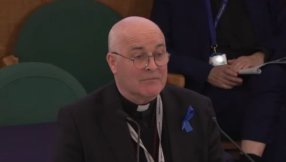
One Christmas, I found myself in Oxford Street, admiring the twinkly decorations and listening to a piped version of Jingle Bells. In Chinese.
Our Christmas songs and carols turn up in some surprising places. They come from surprising places, too. Ding Dong! Merrily on High began life in a French Renaissance dancing manual: 'pied gaulche largy, pied droit approché, empoigner la femme par le saulx du corps, l'eslevant en l'air' (which means, 'Put your left foot out, put your right foot in, pick her up by the waist and twirl her around a bit').
The tune of Good King Wenceslas was first published in Finland (to completely different words, about priests and virgins, mostly). Certainly, not all of them began life with their seasonal associations attached. Some were born to Christmas, some have achieved Christmas, and some have had Christmas thrust upon them.
For example, every Christmas you will find yourself singing a song whose original words were about a dead cow and a delinquent ploughboy. The song was heard in a pub in Forest Green, Surrey, in the leafy commuter-belt fringes of London, by the composer Ralph Vaughan Williams, sung to him by an old man called Mr Garman. Vaughan Williams found a use for the tune a few years later when he was given the job of music editor of the English Hymnal.
He wanted to include a poem by an American bishop called Phillip Brooks, but didn't know (or didn't like) the tune that Brook's own church organist had written for this text back in Philadelphia. So Vaughan Williams helped himself to Mr Garman's folk song. The result - O Little Town of Bethlehem.
That's not the only transatlantic immigrant into our English carol tradition. We Three Kings is American. So is Away in a Manger, which was first published in the journal of the Universalist movement in Boston, Massachusetts. The editors confidently informed their readers that the poem is by Martin Luther. It isn't: they made that up. They claimed they were celebrating the four-hundredth anniversary of Luther's birth. They weren't: they made that up, too (or, at least, got the date wrong).
O Little Town of Bethlehem and Away in a Manger are both sung today to different tunes on either side of the Atlantic. Many of our best-known carol texts have had many musical partners over the years. Different tunes sometimes represent differences between denomination and another, or from one village to the next. Sometimes, a carol would be sung to one tune in church and to a different tune in the pub afterwards. It's all a gloriously eccentric English muddle.
For example, here's a list of names: Old Foster, Tom's Boy, Old Beer, Morchard Bishop, Sweet Chiming Bells, Cambridge New, Fern Bank, Comfort, Hail! Chime on. Names of what? Ale? Cricket teams? Characters in Harry Potter? Actually, they're tunes. All have been sung, at various times and in various places, to While Shepherds Watched. There are many others (including Cranbrook, better known as On Ilkla Moor Baht 'at). Some are deeply mysterious and profoundly moving, like the elegiac Shropshire Funeral Hymn.
Often, tunes turn up in different parts of the country in slightly different versions. London gives us a good example. The composer John Stainer once heard God Rest You Merry, Gentlemen raggedly sung on the streets of the capital by a tattered band of Dickensian urchins. A little later, the folklorist Cecil Sharp collected the same tune in Cambridgeshire. The same, but different: Stainer's tune has a different first note from Sharp's. Somebody, once upon a time, travelled those seventy miles singing carols, and got that a bit wrong, or misremembered it, or changed it.
That's how an oral tradition works. There is no 'correct' version. Even today, hymnbooks and carol collections don't agree on the exact words of Away in a Manger or the precise rhythm of Angels from the Realms of Glory.
This ability to absorb influences from everywhere and nowhere produces memorable, and often rather odd, results.
An excerpt from Deck the Hall: The Stories of our Favourite Christmas Carols, by Andrew Gant, priced £10.99.













